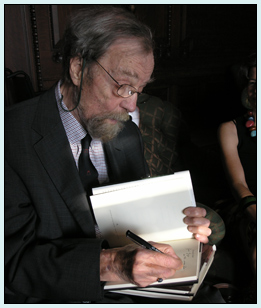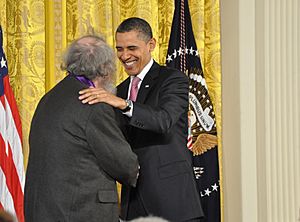Donald Hall facts for kids
Quick facts for kids
Donald Hall
|
|
|---|---|
 |
|
| Born | September 20, 1928 Hamden, Connecticut, U.S. |
| Died | June 23, 2018 (aged 89) Wilmot, New Hampshire, U.S. |
| Occupation | Poet, writer, editor, critic. |
| Period | 1950–2018 |
| Genre | Poetry, essays, children's literature, memoirs, biography |
| Notable awards | Robert Frost Medal (1991) |
| Spouse | Kirby Thompson (m. 1952–67) |
Donald Andrew Hall Jr. (born September 20, 1928 – died June 23, 2018) was an American poet, writer, and editor. He wrote more than 50 books, including poetry, essays, children's stories, and biographies.
Hall went to Phillips Exeter Academy, Harvard, and Oxford. Early in his career, he became the first poetry editor for The Paris Review magazine. He was known for interviewing other poets and authors about their writing.
In 2006, Donald Hall was chosen as the 14th Poet Laureate of the United States. This is a special honor for a poet. People often described his poems as "plainspoken" and connected to rural life. His work showed a deep love for nature and a wish for a simpler past.
Hall was also a respected teacher. He taught at universities like Stanford University, Bennington College, and the University of Michigan. He helped many students learn about writing.
| Top - 0-9 A B C D E F G H I J K L M N O P Q R S T U V W X Y Z |
Life of a Writer
Growing Up and School
Donald Hall was born in Hamden, Connecticut. He was the only child of Donald Andrew Hall and Lucy Wells. He studied at Phillips Exeter Academy and then went to Harvard University. Later, he continued his studies at Oxford in England. He also received an honorary PhD from Bates College.
Hall started writing poems and short stories when he was very young, even before he was a teenager. He kept writing through high school. When he was just 16, he met the famous poet Robert Frost at a writing conference. That same year, he published his first work.
While at Harvard, Hall was part of the The Harvard Advocate magazine. He met many other young writers who later became famous, like John Ashbery and Adrienne Rich. After Harvard, he spent two years at Oxford. There, he edited several magazines and won a poetry award called the Newdigate Prize. In 1952, he married his first wife, Kirby Thompson, and they had a son and a daughter.
After returning to the United States, Hall spent a year at Stanford University studying writing. Then he went back to Harvard for three years. During this time, he put together his first book of poems, Exiles and Marriages.
Life in New Hampshire
While teaching at the University of Michigan, Donald Hall met another poet named Jane Kenyon. They got married in 1972. Three years later, they moved to Eagle Pond Farm in Wilmot, New Hampshire. This farm was his grandparents' old home.
Hall and Kenyon lived and wrote together at the farm. Their life there was even shown in a TV documentary in 1993. Sadly, in 1994, Jane Kenyon became very ill and passed away 15 months later. Hall wrote a book called Without in 1998 about his sadness and how he dealt with her death. Another book of poems, Painted Bed, also explored his grief.
Hall was also involved with the Wesleyan University Press and gave talks at Bennington College.
Donald Hall's Work

Donald Hall wrote 15 books of poetry. Some of his later poetry books include White Apples and the Taste of Stone (2006) and The Painted Bed (2002). His book Without: Poems (1998) was published on the third anniversary of his wife's death. Many poems in Without are about her illness and passing.
Besides poetry, he also wrote memoirs (like Life Work), children's books, and plays. One of his most famous children's books is Ox-Cart Man, which won the Caldecott Medal. His writing often focused on rural life in New England, baseball, and how everyday work gives meaning to life. He was skilled at different poetry styles, both traditional and free verse. He believed that writing was a craft that needed a lot of practice and revision.
Hall won many awards for his writing. These include two Guggenheim Fellowships and the Robert Frost Medal. He also served as the poet laureate of his home state, New Hampshire, from 1984 to 1989.
He also spent a lot of time editing books for the University of Michigan Press. Some of his other awards include the Lamont Poetry Prize (1955), the Lenore Marshall Poetry Prize (1987), and the National Book Critics Circle Award for Poetry (1988). He was nominated for the National Book Award three times. In 1994, he received the Ruth Lilly Poetry Prize for his lifetime of writing.
In 2006, Hall was named the 14th U.S. Poet Laureate. He held this important position from October 1, 2006, for one year. In 2010, President Barack Obama gave him the National Medal of Arts, a very high honor for artists.
His second-to-last work was a recording in 2018 called "Mortality Mansions: Songs of Love and Loss After 60." It featured his poems about life and death, set to music. His very last book, A Carnival of Losses: Essays Nearing Ninety, was published shortly after he passed away in 2018.
Donald Hall in Films
Donald Hall was featured in a short documentary film called Quiet Hours. He also appeared in Ken Burns's 1994 documentary about baseball.
Personal Life
Donald Hall lived at Eagle Pond Farm in Wilmot, New Hampshire, for many years. He was married to the poet Jane Kenyon for 23 years until she passed away in 1995. Donald Hall died at his home in Wilmot on June 23, 2018, when he was 89 years old.
Awards and Honors
- 1952: Newdigate Prize
- 1955: Lamont Poetry Prize, for Exiles and Marriages
- 1956: Edna St. Vincent Millay Award
- 1963–1964: Guggenheim Fellowship
- 1972–1973: Guggenheim Fellowship
- 1984–1989: Poet Laureate of New Hampshire
- 1983: Sarah Josepha Hale Award
- 1986: Horn Book Honour List
- 1987: Lenore Marshall Poetry Prize
- 1988: National Book Critics Circle Award for Poetry
- 1989: Los Angeles Times Book Prize in poetry
- 1990: Robert Frost Medal from the Poetry Society of America
- 1991: Honorary Doctor of Letters from Bates College
- 1994: Ruth Lilly Poetry Prize for his lifetime achievement
- 1999: L.L. Winship/PEN New England Award for Without: Poems
- 2006–2007: Fourteenth U.S. Poet Laureate
- 2010: National Medal of Arts
 | Claudette Colvin |
 | Myrlie Evers-Williams |
 | Alberta Odell Jones |

